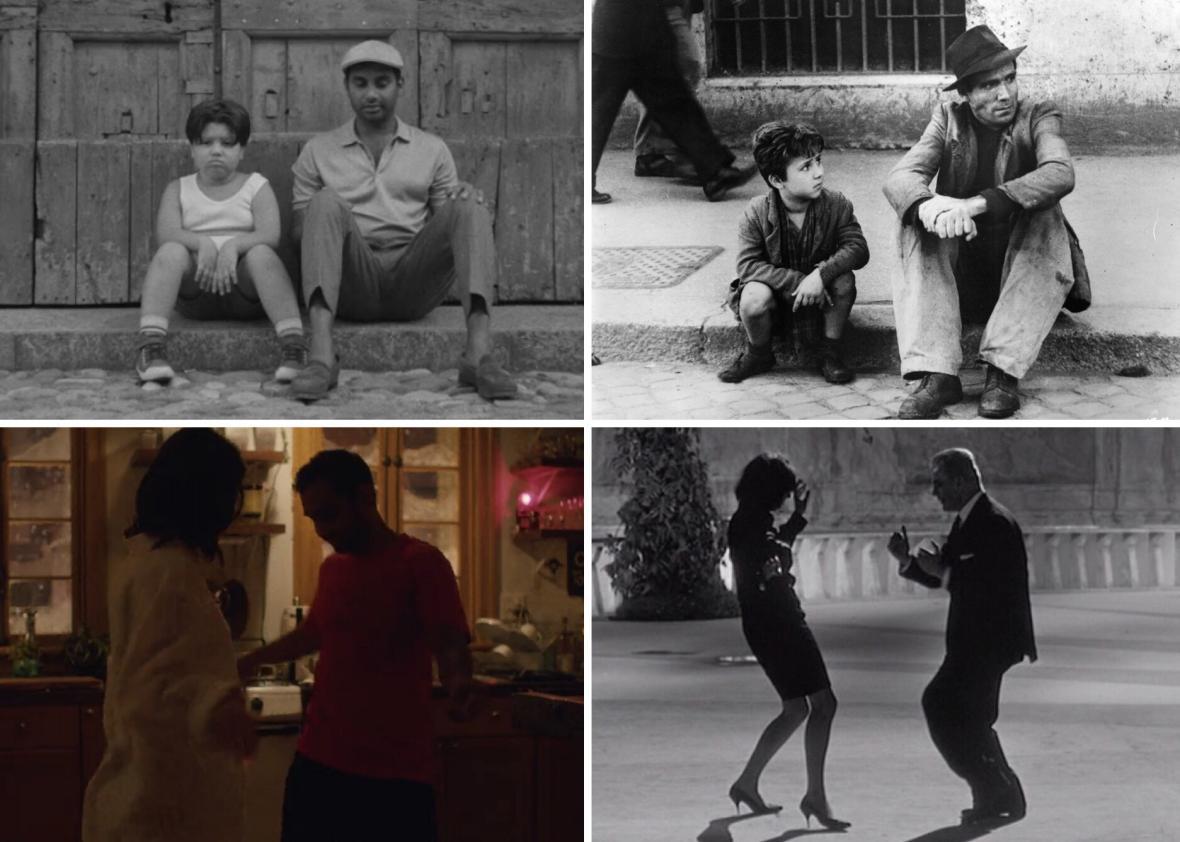The second season of Master of None opens with a wink. In the premiere’s opening shot, the camera pans across across the bed where Dev (Aziz Ansari) is sleeping to a stack of Criterion Collection DVDs of Italian classics. It’s at once a bit of character exposition (Dev, like Ansari himself, has become obsessed with Italian culture), a gesture of amore toward the season’s inspirations, and a joke. If you’ve been paying attention to the opening titles, or the marketing, or the reviews, you’ve probably already figured out that the show is channeling Bicycle Thieves, the movie atop the stack. The pan to the DVD is a nudge in the ribs.
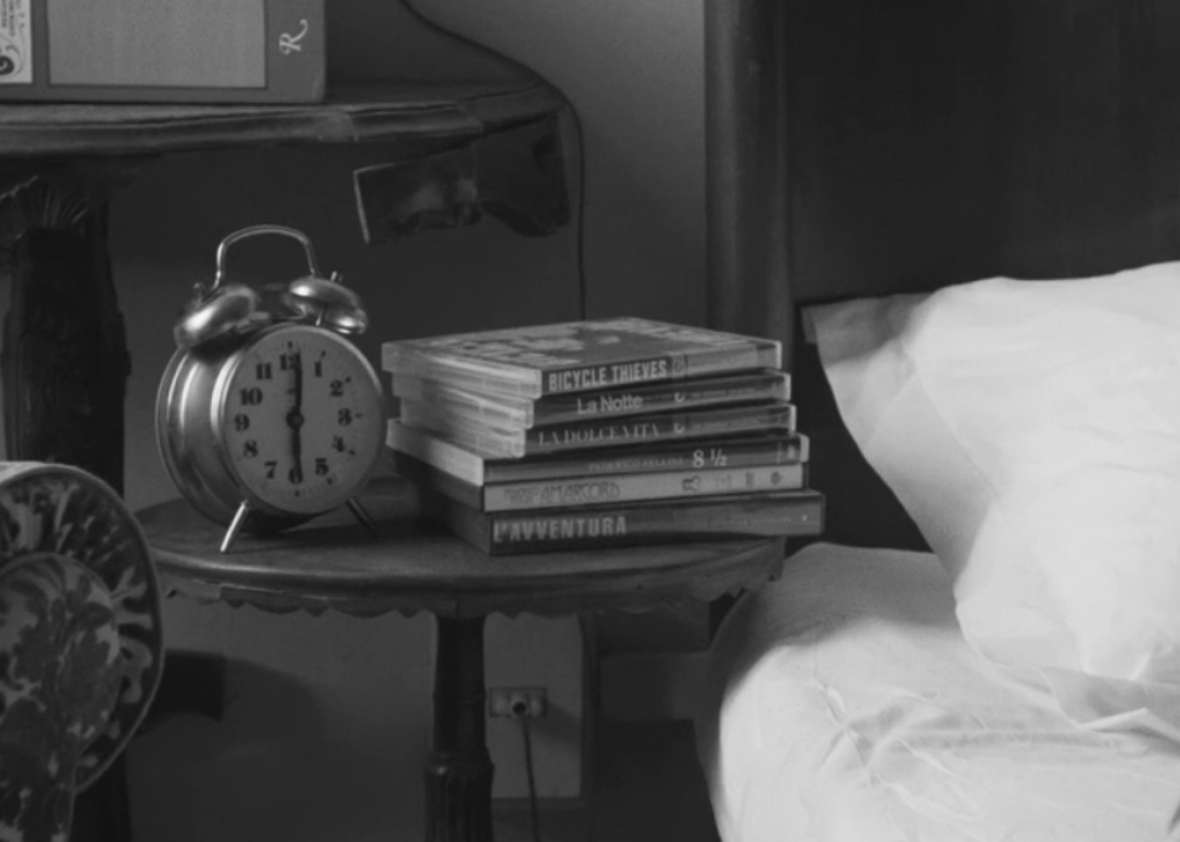
Screengrab from Netflix
But this season tips its hat to many more films than just Vittorio De Sica’s neorealist classic. In fact, it seems to reference or parody most or all of the films on that shelf—and in roughly the order in which they are stacked. It begins with an episode-long pastiche of Bicycle Thieves and climaxes with a near feature-length take on L’Avventura.
Below, we do our best to break it all down, and we’ll keep updating the post as we discover others that we missed. Naturally, pinning down the homages means describing some of the season’s plot, so consider yourself forewarned.
Episode 1, “The Thief” and Bicycle Thieves
The premiere begins channeling Bicycle Thieves from its opening title card, which is styled after the trailer for Bicycle Thieves (which is sometimes called The Bicycle Thief).
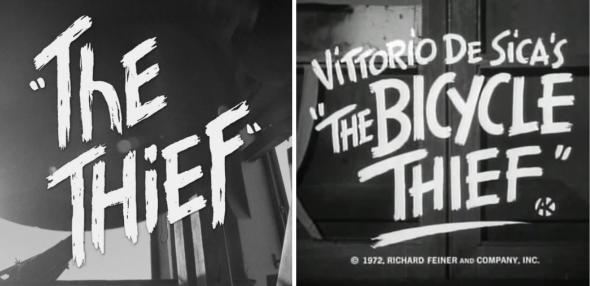
Screengrabs from Netflix and the trailer for Bicycle Thieves
Later in the episode, Dev’s phone is stolen, sending him on a very Bicycle Thieves–esque search through Modena for what he’s lost. Some shots are even lifted straight from Bicycle Thieves, such as the shot of each of the protagonists sitting next to each other on the curb, looking dejected alongside their young companions.
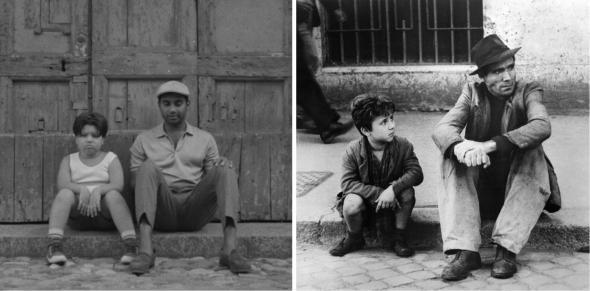
Screengrab from Netflix and still from Bicycle Thieves © 2009 - Corinth Films
Though the stakes in Master of None are much lower (Bicycle Thieves’ Antonio needs his stolen bike in order to support his family, whereas Dev just needs his stolen cell phone to arrange a date), both the episode and the movie end with a similar twist: In each, the protagonists grows so desperate that they end up stealing the same thing that was stolen from them, after which they are confronted for the theft.
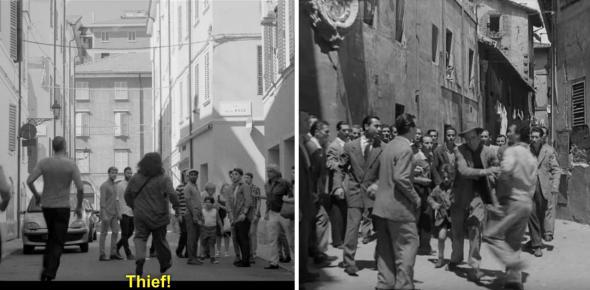
Screengrab from Netflix and screengrab from Bicycle Thieves © 2009 Corinth Films
Episode 2, “Le Nozze” and Antonioni’s La Notte
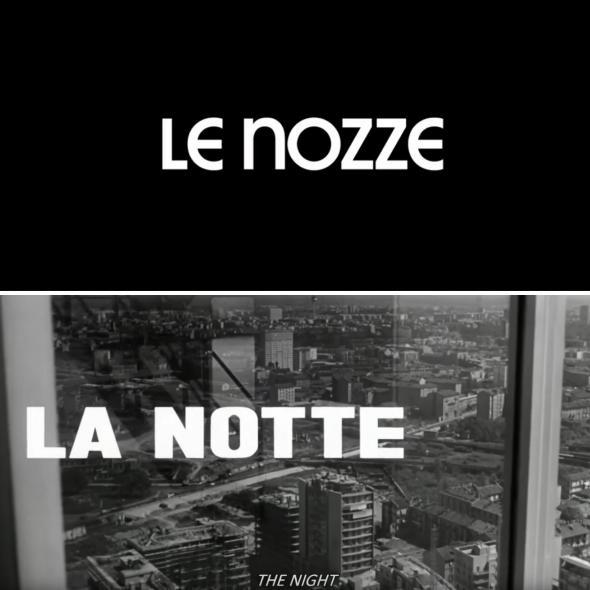
Screengrab from Netflix and screengrab from La Notte
The second DVD on Dev’s shelf is La Notte. The second episode of the season is “Le Nozze.” In addition to having similar names, each also has a similar theme and structure. As the title suggests, most of La Notte (Italian for The Night) takes place over the course of a single evening, at a party, as Giovanni (Marcello Mastroianni) struggles to accept that his wife no longer loves him. Similarly, most of “Le Nozze” takes place over the course of a wedding, as Arnold (Eric Wareheim) struggles to accept that his ex-girlfriend no longer loves him.
“Le Nozze” also seems to spoof the pool sequence in La Notte. In Michelangelo Antonioni’s drama, it begins to rain at the party, prompting the partygoers to jump into the pool in their eveningwear. In Master of None, the same thing happens, with the bride shouting, “Hey everybody! It’s raining! Let’s jump in the pool!”
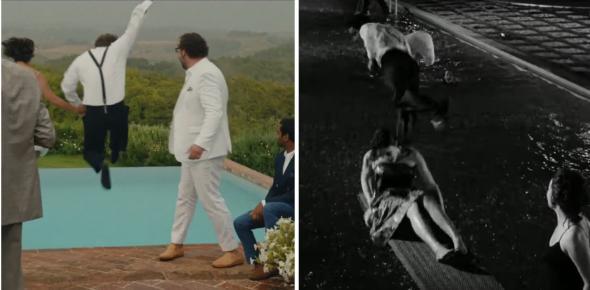
Screengrab from Netflix and screengrab from La Notte
La Notte isn’t the only early-’60s Italian classic referenced in “Le Nozze.” The song that plays over the opening credits is Ryan Paris’ 1983 international smash “Dolce Vita.” The hit was inspired by the third DVD on Dev’s nightstand, Federico Fellini’s La Dolce Vita.
It’s a little more of a stretch, but La Dolce Vita also feels like an inspiration for the scene in “The Thief” when smartphone-clutching fans swarm a famous soccer star hoping for a selfie. We are all Paparazzo now.
The music
“Dolce Vita” is far from the only song in the season that is closely tied with an Italian film. Much of the music comes straight from the soundtracks of Italian movies. The music that opens the premiere, for example, comes from Ennio Morricone’s soundtrack to Luigi Comencini’s Without Knowing Much About Her, while the song that closes the episode comes from Morricone’s music for Come Play With Me. The episode “Amarsi un Po,” meanwhile, is named after an Italian song that seems to have inspired a movie of the same name.
Episode 9, “Amarsi un Po” and L’Avventura (and 8½, plus maybe L’Eclisse and La Dolce Vita)
In this episode, the season’s centerpiece, is Master of None’s most explicit and unmissable reference to Italy’s midcentury classics. In the middle of a snowstorm, Dev invites Francesca—who is in town accompanying her fiancé on his work trip—over to his place to watch L’Avventura. The two get cozy on his couch and we get a glimpse of an intimate romantic scene between Claudia (Monica Vitti) and Sandro (Gabriele Ferzetti)—though soon, in a dream, the lovers of Michelangelo Antonioni’s black-and-white drama are replaced by Master of None’s flirtatious friends.
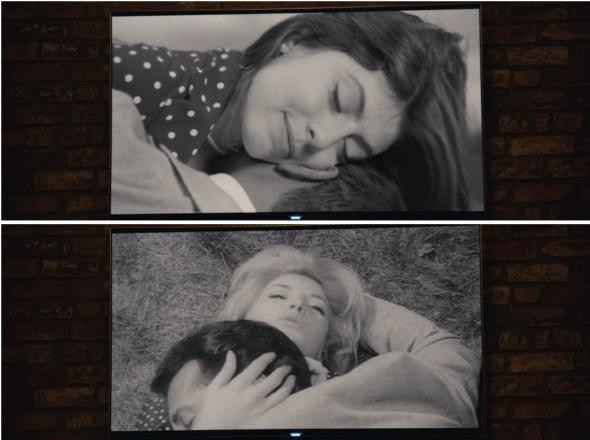
Screengrabs from Netflix
In L’Avventura, Claudia and Sandro have fallen for each other following the mysterious disappearance of Claudia’s friend and Sandro’s fiancée, Anna (Lea Massari), giving their romance an air of illicit electricity. The same can be said of Dev and Francesca’s relationship up to this point, even if they haven’t actually acted upon their attraction. (Francesca’s situation also mirrors Anna’s: Prior to her vanishing, she confesses to Sandro that his most recent, monthlong business trip “was too long. I got used to being without you.”) “Amarsi un Po” takes place over the course of the month that Francesca is in town, and she expresses to Dev her frustrations with Pino and reservations about marrying him. Dev, who is searching for a way to tell Francesca how he feels, opens the door by telling her how beautiful he finds Monica Vitti, as well as her countrywomen Claudia Cardinale and Stefania Sandrelli. Seems like he’s got quite a thing for Italian women.
Aside from L’Avventura, this episode also includes a cute dance in Dev’s kitchen, twisting away to Edoardo Vianello’s “Guarda Come Dondolo.” The song was featured in Dino Risi’s Il Sorpasso, though their dance moves also call to mind Fellini’s 8½.
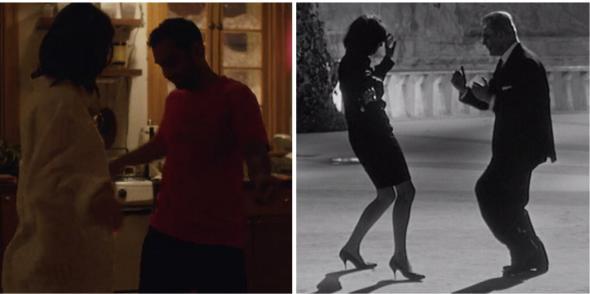
Screengrab from Netflix and screengrab from 8½ © 2010 Corinth Films
And the sequences at the beginning and the end of the episode, which show helicopter shots of New York City and the Statue of Liberty (soundtracked, in the opening, by Italian singer-songwriter Sergio Endrigo’s hit “Canzone Per Te”) may also have been inspired by the famous opening sequence of La Dolce Vita, which shows the protagonist surveying Rome in a helicopter while another chopper carries a statue of Jesus.
As for the reference to Antonioni’s L’Eclisse that Ansari has said is part of the season, it’s not a perfect match, but the shots of Dev and Arnold wandering the streets of New York in the middle of a blizzard vaguely evoke the movie’s famously bleak ending, in which the film’s lovers vanish from the frame and all that’s left is the desolate architecture of contemporary Rome.
Update, May 15: As Master of None co-creator Alan Yang told Inverse, the scene in which Dev and Francesca play at kissing through a glass pane is also a close recreation of a very similar scene in L’Eclisse, in which the paramours played by Alain Delon and Monica Vitti similarly kiss through a window before kissing for real.
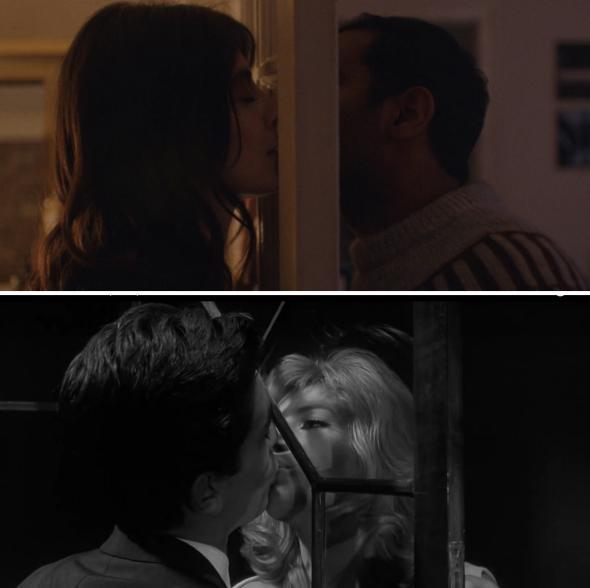
Top: Screengrab from Netflix. Bottom: Screengrab from L’Eclisse on YouTube.
